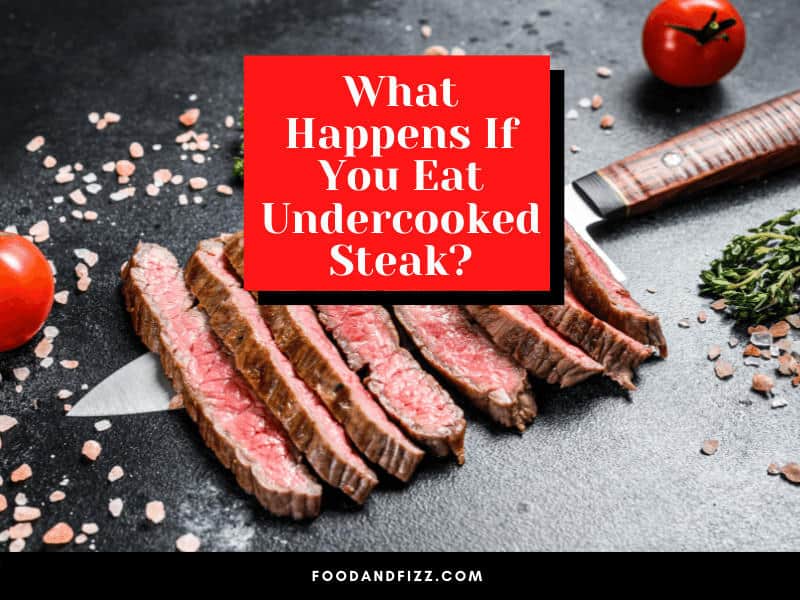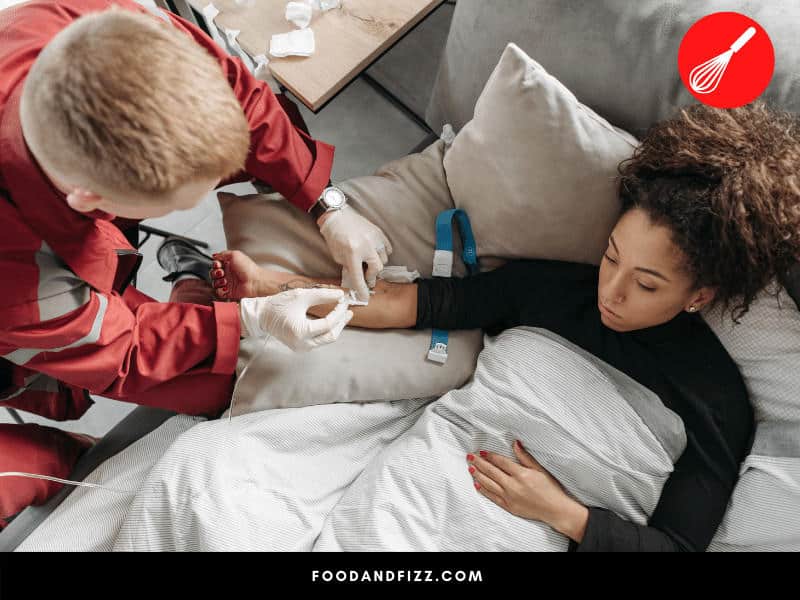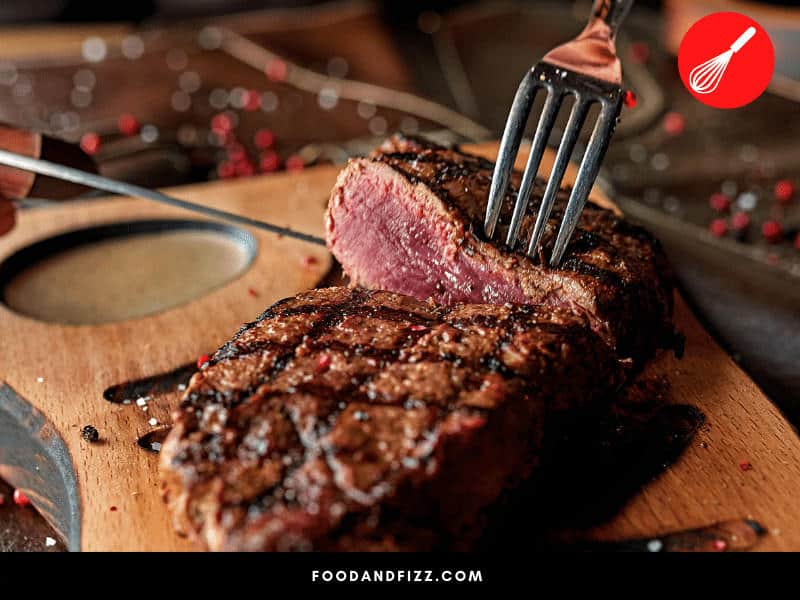What Happens If You Eat Undercooked Steak? I find that many of my friends like to eat their steak rare. Some even want steak so rare that it’s more than just pink in the middle, it’s undercooked to the point where I’d say it was actually raw.
These friends seem to eat their steak with genuine gusto, so presumably, they’re not kidding; they really, truly, deeply enjoy their rare steak, which is all well and good, I suppose but are they running a risk of any unpleasant side effects?
The truth is, they are. Eating undercooked steak can be a risky business, and even the best cooks in the world with the best intentions can’t guarantee the quality of beef.
The trust these cooks place in their suppliers might be based on solid evidence and a long and flawless track record, but accidents do happen, and bad things happen to otherwise careful people.
What Happens If You Eat Undercooked Steak?
If you eat undercooked steak, you risk being exposed to injurious bugs such as Campylobacteriosis, Clostridium perfringens, E.coli, Listeriosis, Salmonella, Shigella, Staphylococcus aureus, clostridium botulinum, and Trichinosis. You also risk putting cancer-causing agents in your body.

Campylobacteriosis
Campylobacter is a diarrhea-causing bacteria. Normally, these bacteria live in the gut and flesh of seemingly healthy animals, making them stealthy, unexpected, and unwelcome visitors in the intestines of humans, where they proceed to wreak havoc and cause illness that could be quite grave.
Campylobacteriosis–the disease caused by these bacteria, is easily avoided by simply cooking steak properly, since Campylobacter is sensitive to heat.
Campylobacter causes vomiting, fever, abdominal cramps and pain, and diarrhea.
Cancer
As exemplified by undercooked steak, we know that red meat can be “carcinogenic [cancer causing] to humans.”
Studies have shown that people who have an above-average intake of red meat run an elevated risk of developing colorectal cancer. As with many cancers, colorectal cancer is an unpleasant and life-threatening disease.
These studies indicate that matters are worse for women because a high level of eating red meat is further implicated in higher risks of developing breast cancer.
All in all, eating a lot of undercooked steaks seems to be the gastronomic equivalent of playing Russian roulette with cancer.

Clostridium Perfringens
According to the CDC (Center for Disease Control), Clostridium perfringens is among the commonest causes of food poisoning in the US, accounting for nearly one million illnesses annually right across the entire country.
Clostridium perfringens lives not just in undercooked steak but also in its gravy. If the cook has prepared sauce using stock or fat from undercooked meat, diners could still get ill even though their steak was well done.
This bacteria causes severe diarrhea, leading to dehydration. However, most people recover within a day, even without antibiotics.
E.coli Food Poisoning
Not all strains of Escherichia coli (E. Coli) are dangerous, but those that are, are pretty darn dangerous. When present in undercooked steak, the bug enters the human system. It wreaks havoc, causing an illness called hemolytic uremic syndrome, when toxins from the bacteria destroy red blood cells, causing kidney failure.
E. coli can be life-threatening, and professional medical help must be sought when symptoms persist.
The symptoms of E. coli are diarrhea, which may be mild or severe (when severe, there may be blood in the stool). There might also be vomiting (but this symptom doesn’t always occur), stomach pain, and probably some cramping, which can get severe.

Listeriosis
Listeria monocytogenes are unfunny bacteria that can cause severe illness in vulnerable groups such as immunodeficient individuals and pregnant women.
In this latter group, unfortunate outcomes can even include miscarriage, stillbirth, or even premature delivery, and of course, preterm delivery can cause lifelong issues for the unfortunate child.
Listeriosis, the disease caused by Listeria monocytogenes, will make itself apparent within a day of ingesting the infected (undercooked) steak. Symptoms can include watery diarrhea, fever, body aches, and fever.
Botulism
Botulism is caused by the Clostridium botulinum bacterium. Botulism is rare, which is extremely fortunate because it is a deadly disease. The Clostridium botulinum bacterium is hardy little so-and-so and survives happily in soil or water.
However, the bacterium hates acidic environments and heat, so foods that don’t contain strong acids, like vegetables, poultry, meat, and fish, are perfect habitats. The best (and easiest) way to avoid botulism is to eat properly cooked food, which means avoiding undercooked anything, including steak.
Botulism symptoms are trouble speaking, trouble seeing, extreme tiredness, and muscular weakness.
Salmonellosis
Salmonellosis is a nasty disease caused by the Salmonella bacterium, which transfers into humans through the ingestion of undercooked beef.
Salmonella survives quite happily in the gut of humans and animals alike, but in our case, Salmonella spreads into the bloodstream and other parts of the body, especially our joints and bones.
Like most food poisoning, the symptoms are watery diarrhea, abdominal cramps, fever, and pain in the joints.
Shigellosis
Shigella bacteria cause Shigellosis, another kind of food poisoning. Across the US, about 450,000 Shigellosis occur annually, so it is something of a nuisance, probably because it spreads so easily. It takes only a few of these bacteria to cause illness, and people can keep spreading the disease for weeks after infection.
Shigella spreads through touch, so eating undercooked food prepared by someone who has the disease is a sure and easy way to catch it.
However, a bit like typhoid, Shigella has several vectors for transmission, including touching infected surfaces, caring for an infected person, changing the diapers of an infected child, and swimming in a swimming pool or lake with an infected person, even sexual contact with an infected person.
The symptoms of Shigella are diarrhea with blood, wanting to go to the bathroom even when there is no stool to pass, fever, and severe stomach pain.
Staphylococcus Aureus
One of the most familiar forms of food poisoning, Staphylococcus aureus, causes the symptoms which appear soon after eating undercooked contaminated meat.
Usually, our bodies throw off the illness pretty quickly, say in about a day or two, because we already have many staph bacteria on us and in our noses anyway. This means near-antigens are likely to exist and need only a little tweaking to get rid of the infection.
Staphylococcus aureus symptoms include dehydration, vomiting, diarrhea, and low blood pressure.
Trichinosis
This pretty serious disease is caused by the larvae of a worm, Trichinella spiralis. We get infected by eating undercooked meat, including undercooked steak, but especially from eating undercooked pork.
Trichinella worms take up residence in our muscles and gradually travel all over the body. Symptoms of this disease are eye swelling, headaches, muscular pain, chills, fever, abdominal pain, and diarrhea.
These may be accompanied by extreme tiredness and lethargy, thirst, and profuse sweating. In the most severe cases, there can be difficulty breathing, difficulty coordinating movements, and inflammation of the heart muscles.

Afterword: What Happens If You Eat Undercooked Steak?
The incidence of illness from eating undercooked steaks is not at pandemic levels, so it is not as if you’re guaranteed to have a problem if you eat it.
However, like with Russian roulette, when you lose your bet against the risk, the results can be severe, even fatal. Eating undercooked steak is a personal choice, of course, but it is hard not to wonder if the juice is worth the squeeze, so to speak.

Frequently Asked Questions on What Happens If You Eat Undercooked Steak
Can I Eat Undercooked Steak?
Eating undercooked steak puts you at risk not just for dangerous bacteria that causes food-borne illnesses, but other health conditions that can be serious and life-threatening.
Can Cooking Your Meat Longer Kill Illness-Causing Bacteria?
Cooking kills bacteria that’s why it is important to cook meats to their designated safe internal temperatures but it cannot neutralize toxins already in the meat, so it is important to practice safe handling and storage procedures to avoid getting sick from eating meat.

